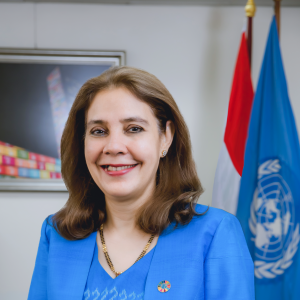- YE Bapak Sandiaga Uno, Minister of Tourism and Creative Economy
- Acting Governor Bali, Sang Made Mahendra Jaya
- Ibu Martini, Deputy Minister, Ministry of Tourism and Creative Economy
- Bapak Neil, Deputy Minister, Ministry of Tourism and Creative Economy,
- UN DESA colleagues
I am delighted to join you in Bali as we accelerate progress on leveraging Indonesians’ leadership for an inclusively creative economy for sustainable development.
Bali hosted the World Conference on Creative Economy in 2018 and 2022 and is set to host the conference again for the third time in 2025.
Last year, Indonesia played a key role in the adoption of the General Assembly resolution on the creative economy which emphasizes the importance of cultural heritage and creative expressions.
It also calls on Member States to mainstream the creative economy into national development plans and bolster an enabling environment at all levels of society.
Moving forward, Indonesia’s lead on this agenda will be vital for a just, and inclusive society in line with the SDGs.
SDG progress in country has been much more robust than the global average with 62% of indicators on track.
Capitalizing on this momentum will be key for Indonesia’s goal to become a high-income country before mid-century with a dominant middle class.
Underlining this transformation will be the country’s growing creative economy, which can leverage the potential of women and young people across cities and villages nationwide.
We can tap into their can-do spirit in fine arts, fashion, filmmaking, animation, handicrafts, music, culinary arts, jewellery and many other creative endeavours.
Bali exemplifies the benefits of a creative economy in not only generating sustainable growth but also enriching lives and strengthening social bonds.
The island is an important part of Indonesia’s creative economy, which collectively accounts for 13% of the workforce and contributes to 8% of GDP.
For the UN three priority areas are key as Indonesia’s creative sector grows.
First, to champion sustainable fashion and fabrics in partnership with the Indonesia Global Compact Network to take local products to international markets.
Fashion and fabric are leading contributor to the creative economy and directly impact lives of women weavers and producers.
We had our first dialogue with women fashion designers from the Middle East, Africa and Asia on sustainability and we are working to leverage the international Fashion Week to shine a light on batik and other sustainable Indonesian products for global markets.
This is critical as sustainable fashion is more than just a passing trend. It is a growing movement backed by increasing demand.
Second, a focus for MSMEs in the creative economy needs to be on branding their products.
This will facilitate securing a larger market share through name recognition.
One recent example is the launch of MyNyale, the first collective brand in West Nusa Tenggara supported by UNIDO.
In addition to being a brand, MyNyale serves as a strategic platform for MSMEs by uniting diverse sectors with a shared vision for sustainability.
It also promotes and preserves the cultural heritage of West Nusa Tenggara. And empowers MSMEs to compete across national and global markets.
Three, we need to empower enterprising women through upskilling and reskilling given that they play a dominant role together with young people in this sector.
As part of this, ITC has supported over 300 women weavers from local villages in East Flores to receive hands-on training to produce export-quality placemats on long-term orders for a multinational.
The women are spreading their newly learned skills to others in their communities, showing that once good practices are adopted, they spread rapidly.
As most of Indonesia’s creative economy remains informal, there is also a need to create decent work with matching incomes.
I am heartened by the Government’s commitment to increase the coverage of social insurance for informal workers by four times over the coming five years – an important step for decent work!
Beyond boosting its own creative economy, Indonesia is also well positioned to spread best practices and lessons learned to other nations in the spirit of South-South Triangular Cooperation.
The UN stands committed to supporting Indonesia to enable the country to showcase its unique cultural heritage and creative outputs globally.
Thank you.




